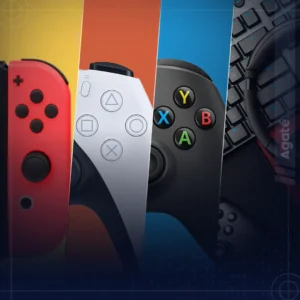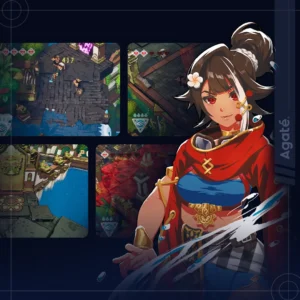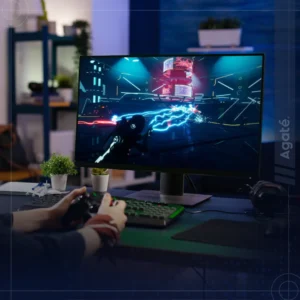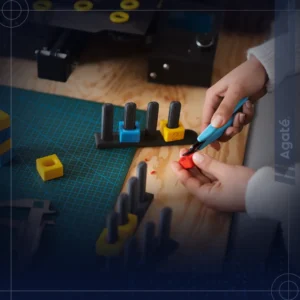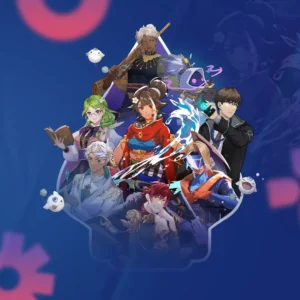Co-development has been common in the video game business for a long time. Although outsourcing in any form of content in video game development was once considered a bad thing, it has been recently considered beneficial for all parties. Its impact has increased significantly in recent years as triple-A games have become larger and more complex. You might have noticed that some of the most popular titles in recent years have been developed by more than one studio. This is one of the many reasons why today, Agate has spread its services to co-development. Co-development can take many forms, such as outsourcing, joint ventures, partnerships, or alliances. But for those who aren’t aware, let’s find out what co-development in game development really is!
What is Co-Development?
Co-development is when two or more studios collaborate to make a video game. They can share their resources, skills, and technologies to make a game that is better than what they could do alone. Co-development can have different forms, such as two studios working on separate parts of the game or a bigger team of studios working on everything together.
Co-development has been a common practice in the video game industry for many years, but it has gained more traction in recent times. This is because modern video games have become increasingly complex, and it’s challenging for a single studio to handle all aspects of game development. Co-development allows studios to focus on their strengths and work together to create a complete game that is of high quality. It also helps to reduce the risk and uncertainty associated with developing a game alone, as studios can share the costs and resources required to create a game.
Why is Co-Development Becoming More Popular?
The video game industry is seeing more co-development for several reasons. One reason is that modern video games are very complex. It is hard for one studio to do everything by itself. Co-development lets studios focus on what they are good at, such as graphics or gameplay, and work together to make a complete game.
Another reason is that video games are very expensive to make. It can cost millions of dollars to make a high-quality game, and many studios don’t have enough money to do it on their own. Co-development helps studios split the costs of making a game, making it easier to make high-quality games without spending too much money. Lastly, co-development helps studios learn from each other and improve their own skills. By working together, studios can benefit from each other’s strengths and expertise. This can lead to better games and faster development times.
What are the benefits of co-development?
- It allows studios to share resources, expertise, and technology, which can improve the quality and scope of the game.
- It enables studios to access new markets, audiences, and platforms, which can increase the sales and reach of the game.
- It fosters innovation and creativity, as studios can learn from each other and experiment with new ideas and genres.
- It reduces risk and uncertainty, as studios can mitigate the challenges and costs of developing a game alone.
However, co-development also comes with some challenges, such as:
- It requires clear communication, coordination, and trust among the studios involved, which can be difficult across different cultures, languages, and time zones.
- It involves sharing intellectual property rights, revenue, and control over the game, which can create conflicts and disputes among the studios.
So, is co-development the future of video game production? There is no definitive answer to this question, as different studios have different goals, preferences, and strategies. Even so, there are more pros than cons when it comes to co-development, especially in making games. What is certain is that co-development is a growing trend in the video game industry that offers plenty of opportunities for all parties in game development.
What does co-development offer?
There are several types of co-development, depending on the company that offers such services. A company may only have a part of video game development, some have a few services to offer, and some may have several services. At Agate, we offer full-cycle development, art, and porting services for co-development projects. Full-cycle development means that Agate can handle all aspects of game creation from concept to launch. Art service means that Agate can create high-quality art assets for games, such as 2D and 3D graphics, animations, UI, and VFX. While porting service means that Agate can adapt games to run on different platforms, such as PC, consoles, mobile, and VR. With around 300 team members who are experienced in both Unreal Engine and Unity, Agate can deliver exceptional games that can cater to the needs of all clients that require such services from Agate.
As technology evolves and consumer expectations rise, co-development might become more prevalent and essential for creating a plethora of gaming experiences.
Conclusion
Co-development is becoming increasingly popular in the video game industry due to the complexity and cost of creating high-quality games. Co-development allows studios to share resources, expertise, and technology, which can improve the quality and scope of the game, access new markets and platforms, foster innovation and creativity, and reduce risk and uncertainty. However, co-development also comes with challenges such as clear communication, coordination, trust among the studios involved, and sharing intellectual property rights, revenue, and control over the game. While there is no definitive answer to whether co-development is the future of video game production, it is a growing trend that offers plenty of opportunities for all parties involved in game development. Companies like Agate offer various co-development services, including full-cycle development, art, and porting services, to cater to the needs of clients in the industry. As technology evolves and consumer expectations rise, co-development may become more prevalent and essential for creating a wide range of gaming experiences.
Are you looking for co-development, art services, or game porting? Look no further than Agate!
Don’t hesitate to get in touch with us today and learn more about how we can help you take your project to exceptional heights.

